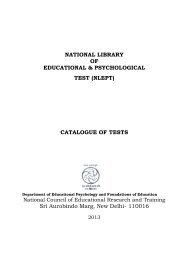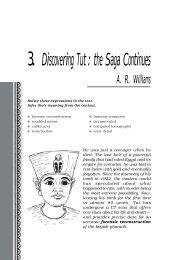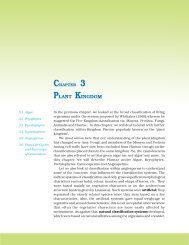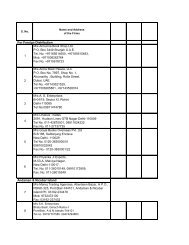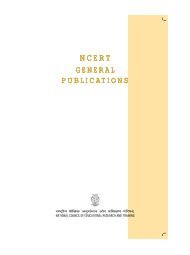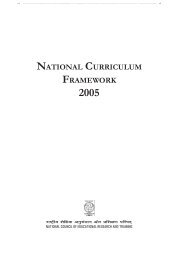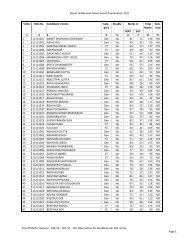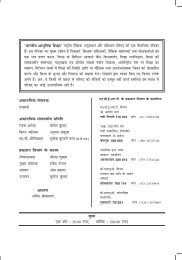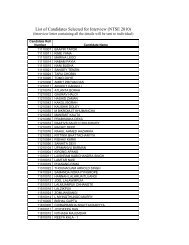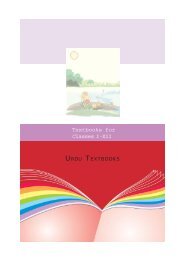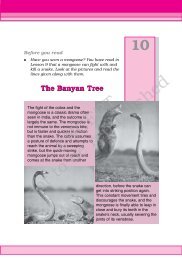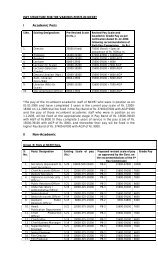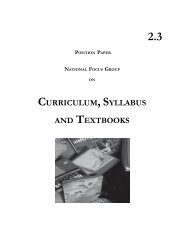Annual Report - National Council Of Educational Research And ...
Annual Report - National Council Of Educational Research And ...
Annual Report - National Council Of Educational Research And ...
Create successful ePaper yourself
Turn your PDF publications into a flip-book with our unique Google optimized e-Paper software.
552 teachers of Classes I to IV, 44 teachers of Classes V to VIII, 529 Block<br />
Resource Teacher Educators (BRTEs), 2239 students studying in Classes II-V<br />
and 1317 parents of children studying in Classes II to V. In each of the sampled<br />
school, two focus group discussions were held, one with VEC members and<br />
another with community members. A total of 560 focus group discussions were<br />
held. In addition, 1112 classrooms were observed. The study concluded that<br />
aall teachers and BRTEs involved in implementing ABL were trained on important<br />
aspects of ABL. BRTEs reported a few challenges faced during the training period.<br />
VEC members were aware about ABL to some extent. However, a wide variation<br />
in awareness still existed across schools; and a large number of schools, space<br />
was adequate, logos were pasted on trays, ladders and trays were put up and<br />
kept at a height accessible to students, students sat in their respective groups<br />
and students’ recent creative work was displayed in classrooms.<br />
Most of the teachers were satisfied with all the dimensions of training duration,<br />
methodology followed for training, quality of training materials, follow-up activities<br />
and competency of trainers. Views of educational experts, teachers and students<br />
indicate that the ABL has enabled teaching-learning process to move away from<br />
textbooks and use of variety of learning materials was appreciated in ABL.<br />
Students preferred colourful small sized cards with medium sized fonts having<br />
pictures related to daily life. Teachers were of the view that supplementary reading<br />
materials made available in ABL classes provided scope for extended reading.<br />
There were some inaccuracies reported in illustrations of some cards. Classroom<br />
practices were found to be better organised in Chennai schools. However, there<br />
is enough scope for improvement in other schools. Large sections of ABL (Classes<br />
II to IV) and non-ABL (Class V) students had positive perceptions about various<br />
aspects of ABL. Students reported that learning through cards was not only<br />
joyful but also allowed them to work with attractive pictures and learn through<br />
playful activities. Students prefer to work individually and with the help of peers.<br />
A substantial number of teachers and BRTEs have a positive perception towards<br />
ABL methodology. Most teachers consider the evaluation strategy followed in<br />
ABL appropriate. Student achievement scores in all subject areas are at desirable<br />
levels; however, certain topics have been identified in which students face<br />
difficulties and therefore, need remedial measures. ABL has led to the emergence<br />
of a high level of self-confidence among many students. Students have no fear of<br />
teachers or examinations as each child is tested based on what he or she has<br />
learnt. ABL methodology promotes self-learning among students and provides<br />
ample opportunities to enhance their creativity. Parents reported that with the<br />
advent of ABL, children no longer needed to carry heavy loads of textbooks. ABL<br />
has increased teachers’ involvement in classroom practices and improved the<br />
organisation of curricular activities.<br />
DEVELOPMENT<br />
Development of Audio-Video Spots for Advocacy of Early Childhood Care<br />
and Education<br />
The project aimed at developing audio-video spots to create awareness about<br />
the importance of ECCE, to sensitise teachers, educational administrators, parents<br />
and the community about the significance of their role in improving the quality<br />
of ECCE and motivate them to perform their role effectively. During the<br />
development process, a few workshops were conducted to finalise the themes<br />
<strong>Annual</strong> <strong>Report</strong> 2010-11<br />
<strong>Annual</strong> <strong>Report</strong> 2010-11<br />
<strong>Annual</strong> <strong>Report</strong> 2010-11<br />
21



